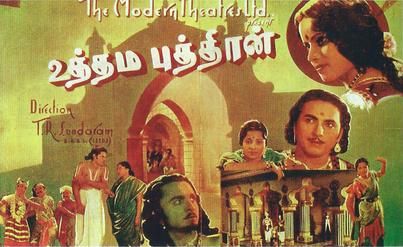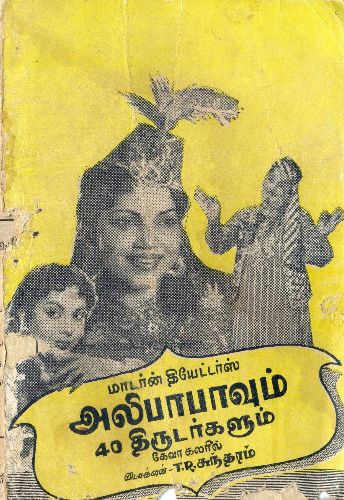This section is for paid subscribers only. Our subscription is only $3700/- for one full year.
You get unlimited access to all paid section and features on the website with this subscription.
Subscribe to read full article
This section is for paid subscribers only. Our subscription is only $37/- for one full year.
You get unlimited access to all paid section and features on the website with this subscription.
Not ready for a full subscription?
You can access this article for $2, and have it saved to your account for one year.
- Release Date24/10/1940
- GenreHistorical Fiction
- FormatB-W
- LanguageTamil
- Run Time212 min
- Length5831 meters
- Number of Reels19 reels
- Gauge35 mm
- Censor RatingU
Utthama Puthiran is inspired by the major Hollywood hit The Man in the Iron Mask (1939), based on the French fiction maestro Alexandre Dumas’ novel.
King Varguna Pandian is childless. After a very long time, his wife gives birth to identical male twins. Their cunning minister Naganathan (T.S. Balaiah) convinces the king that twins are harmful for their nation and hence assures him that he would bring up one child under his guidance, but orders the infant’s killing. When the child is taken to the forest to be killed, he is rescued by ex-army chief Surasenan. Vikraman (P.U. Chinnappa), who is brought up in the palace, turns into a villain in character while Chokkan (again P.U. Chinnappa) is a kind-hearted and brave man, brought up by Surasenan. The King is depressed to see Vikraman’s recklessness and dies. Vikraman becomes the king and under the wrong guidance of Naganathan, imposes several taxes on common people. Instead of ruling the country, he enjoys the comforts of the palace and a concubine. Unable to tolerate the atrocities, Chokkan, and Surasenan joins the citizens to fight the king. They are arrested and brought to the palace. Both Vikraman and Naganathan get surprised to see Chokkan looking identical to Vikraman. Instead of punishing Chokkan, they plan to use him. On coming to know that the citizens plan to attack and kill Vikraman en route to the temple, they advise Chokkan to go to the temple dressed like the king. Naganathan threatens to kill Surasenan if Chokkan does not obey the king’s orders. Chokkan is attacked by the citizens en route, but he convinces them and promises to solve their issues. Another minister Gunaseelan comes to know about Chokkan and takes his help to resolve the issue of his engagement with Meenakshi (M.V. Rajamma), the princess of the Chola kingdom. When Vikraman comes to know that Chokkan was present at the engagement with the princess, he gets angry and orders Chokkan’s death. To save Chokkan, Surasenan reveals to minister Gunaseelan that Chokkan is not his son, but the king’s second twin son, the infant whose killing was ordered by Naganathan. The minister reveals this to the queen mother and she is overjoyed. All of them meet Vikraman to share this news with him. But Vikraman gets upset that he has a competitor (whom he hates) to run the country. He orders that Chokkan be imprisoned with a metal mask on his face so that no one will know who he is. He locks the mask and takes the key away.
Learning this, minister Gunaseelan makes Meenakshi seduce Vikraman to collect the key from him and saves Chokkan and Surasenan. Now Chokkan puts the mask on Vikraman and imprisons him. Gunaseelan organizes Chokkan’s wedding with Meenakshi. Vikraman writes this news on his dinner plate and sends it to Naganathan. On the marriage day, Naganathan comes to know the truth, rushes to the prison, releases Vikraman, and tries to bring him to the palace to reveal to the people that Chokkan is not the king. But on the way, they are attacked by Chokkan, Surasenan and his friends and in the ensuing fight, Naganathan and his army are killed. Vikraman gets killed when the chariot he travels in, falls from a cliff. Chokkan marries Meenakshi and rules the kingdom wisely.
‘Senthamizh Naadenum Podhiniley…’ by Mahakavi Bharathiyar, ‘Inneram Yenna Seida...’ and ‘Manamohana...’ were the popular songs of the film.
The film became a huge success and established P.U. Chinnappa, the singer-star of the 1940s as a hero.
It was the first double-action Tamil film in which both appeared simultaneously on the screen and became a trend setter for future films in the same format. The first double-action scenes of P.U. Chinnappa was shot by Bodo Gutschwager, a German technician.
This film was remade in 1958 with Sivaji Ganesan under the same title.
[from the book Pride of Tamil Cinema: 1931 to 2013, G Dhananjayan. Blue Ocean Publishers. 2014]

Cast
Crew
-
BannerModern Theatre Ltd, Madras
-
Director
-
Producer
-
Music Director
-
Lyricist
-
Story Writer
-
Screenplay
-
Dialogues
-
Cinematography
-
Editing
-
Art Director/Production Design








.jpg)



